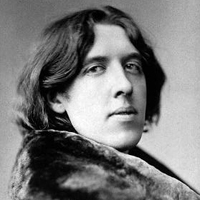Wilde's Style in The Importance of Being Earnest
This play is characterized by the use of misapplied logic. Misapplied logic is similar to the old joke in which a man is asked where the second national Bank is located. He replied that he does not even know where the First National Bank is. For examine, Algernon, in Act one, cautions Jack not to eat the cucumber sandwiches, which are for lady Bracknell.

Oscar Wilde (1854-1900)
Jack points out that Algernon himself has been eating them steadily. Algernon replies: Time is quite a different matter. She is my aunt.
Paradox is the hallmark of Wilde's style. His style is frequently marked by the use of paradox. Paradox is a statement that seems contradictory, unbelievable or absurd. Lady Bracknell is questioning Jack to find out whether he is a desirable suitor for her daughter. She asks: "You have a town house, I hope? A girl with a simple, unspoiled nature, like Gwendolen, could hardly be expected to reside in the country? (Girls with simple, unspoiled natures are of course usually expected to live in the country). In another sense, Gwendolen refers to her father. She says she is glad that nobody outside of his home has ever heard of him: "I think that is quite as it should be. The home seems to me to be the proper sphere for the man" (This turns upside down the common saying that the proper place for a woman is in the home.)
In Oscar Wilde's use of language is a triumph of glittering, scintillating, loquacious effect. It seems Wilde's use of descriptive style is tainted with unnecessarily elaborated adjectives. Lady Bracknell describes Miss Prism as a" female of repellent aspect, remotely connected with educations" Algernon remarks about a recently developed acquaintance: "I hear her hair has turned quite gold from grief." Miss Prism describes a novel she once wrote. "The good ended happily, and the bad unhappily. That is what fiction means."
Another side of Wilde's style is recognized as the style of making an inverted parody of the stock romantic situation in which the lover's devotion alone, not their names, as meaning. The following excerpt illustrates how Wilde made use of a stylistic device of inversion and parody.
Jack: You really love me, Gwendolen?
Gwendolen: Passionately!
Jack : Darling ! You don't Know how happy you've made me.
Gwaendolen: My own Earnest!
Jack: But you don't really mean to say that you could to love me if my name was not Earnest?
Gwendolen: But your name is Earnest.
Jack: Yes, I know it is. But supposing it was something else? Do you mean to say you could not love me then?
Gendolen (glibly): Ah! That is clearly a metaphysical speculation, and like most metaphysical speculations have very little reference at all to the actual facts of real life, as we know them.
This scene is an inverted parody of the stock romantic situation in which the lovers' devotion alone, not their names, has meaning. Other inversions of such romantic clichés are found in epigrams and certain conversational exchanges constructed on the principle of the reversal of our expectations. A simple example is represented by Algernon's views on marriage proposals: "I really do not see anything romantic in proposing. It is very romantic to be in love. But there is nothing romantic about a definite proposal why, one may be accepted." Wilde's constant reversal of our romantic expectations in stock situations and epigrammatic speech represents one of his methods of constructing a play based upon the principle that in art, form style is higher than representational truth or morality.
The Importance of Being Earnest
The Importance of Being Earnest as a Comedy of Manners
Dramatic Technique in The importance of Being Earnest
A Satire on the Victorian Age in The Importance of Being Earnest
The Changing Status of Women in The Importance of Being Earnest
The Importance of Being Earnest
Introduction of The Importance of Being Earnest
Summary of The Importance of Being Earnest
Comedy of Manners: Literary Terms
 |
bachelorandmaster.com |